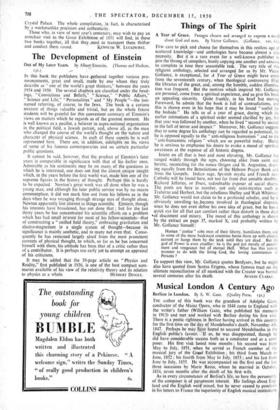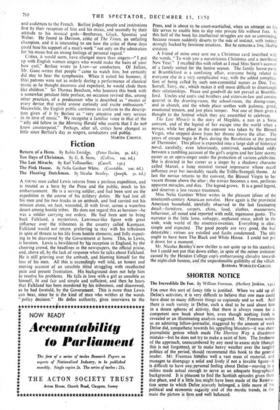Musical London A Century . Ago Berlioz in London. By A.
W. Ganz. (Quality Press.ifs.) - THE author Of this book was the grandson of Adolphe Ganz. conductor of the Mainz Opera, who in 1848 came to England with the Writer's father (William -Ganz, who published his memoirs in 1913) and-Met and worked with Berlioz during his first visit. There is a poetic rightness in Berlioz having arrived in this country for the first time on the day of Mendelssohn's death, November 4th. 1847. .,Perfiatis he may have hoped to succeed Mendelssohn in the English -public's favour. If So, he wasdisappointed, though he did have considerable success both-as a conductor and as a com- poser. His first -visit lasted nine months ; his second was from May to- July, 185I, when he seriied as French member of the musical jury of the Great .Exhibition his third from March to June,-1852 ; his fourth frOrn May to July, 1853 • and his last from June to July, 1855. He was abcompanied On the first and the last three 'occasions by Marie Reeio, whom he married in October, 1854, seven months after the death of his first wife. As in every circumstance of Berlioz's life, so here the personality of the composer is of paramount interest. His feelings about Eng- land and the English wire( mixed, but he never ceased to proclaim in his letters to France the superiority of English musical institutions and audiences to the French. Berlioz judged people and institutions first by their reception of him and his music, and secondly by their attitude to his musical gods—Beethoven, Gluck, Spontini and Weber. He found in Davison, critic of The Times, an unfailing champion, and it is interesting to see how the critic of those days could base his support of a man's work "not only on the admiration for his music but on strong feelings of personal regard." Critics, it would seem, have changed more than singers—" I put up with English women singers who would make the hairs of your bow curl," Berlioz wrote to Lvov—or conductors. Of Jullien, Mr. Ganz -writes that people "came to watch him, but certainly did stay to hear the symphonies. When it suited his humour, if (his) patrons were not as orderly during a performance of classical music as he thought decorous and expedient, he would chide them like children." Sir Thomas Beecham, who honours this book with a somewhat petulant little preface, on occasion revived this, among other practices, of a predecessor who is described as "master of every device that could arouse curiosity and excite enthusiasm." Meanwhile, the English public continues to conform to the descrip- tion given of it by Berlioz as "very attentive and very serious in its love of music." We recognise a familiar voice in that of the "silly old fellow in the Morning Herald who asserts that I do not. know counterpoint." Perhaps, after all, critics have changed as little since Berlioz's day as singers, conductors and public.
MARTIN COOPER..







































 Previous page
Previous page